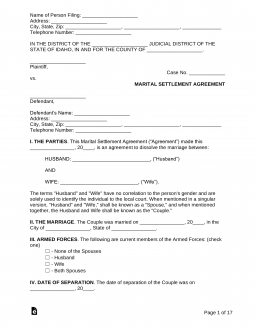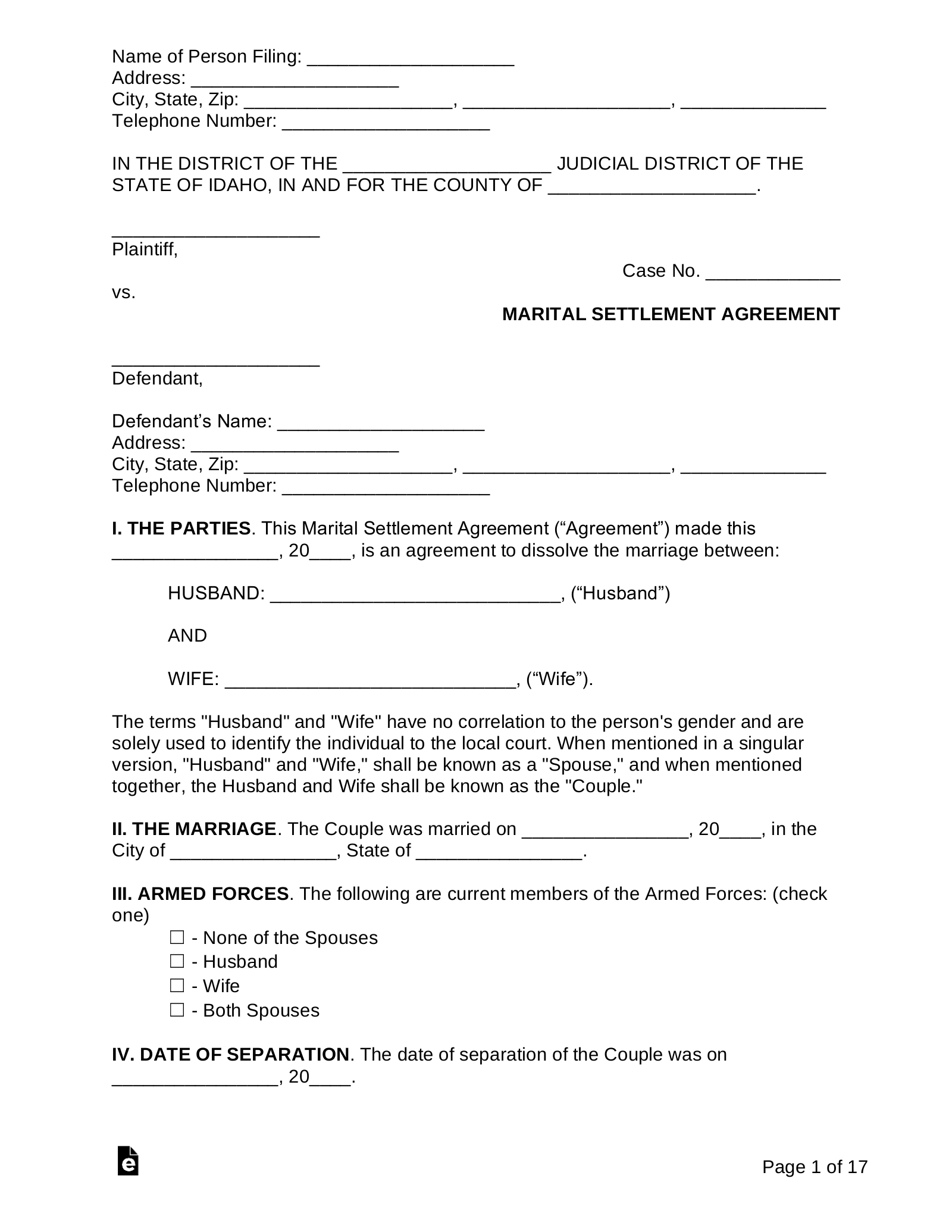Updated October 03, 2023
An Idaho marital settlement agreement is used to govern the rights and responsibilities of spouses following the termination of their marriage. The settlement terms will address important matters such as the couple’s financial support obligations, parental obligations, child custody rights, and the division of property, debts, and assets. Spouses will need to disclose their finances to ensure that alimony and child support payments are apportioned fairly. If there is a disagreement between the parties, a professional mediator may be hired to resolve any existing issues. A judge will review the final agreement before granting the divorce. Assuming that the judge considers the agreement to be fair and that it was executed without coercion, the divorce will be granted, thus enforcing the conditions of the settlement agreement.
Table of Contents |
Divorce Laws
Statutes – Title 32, Chapters 6 – 8
Alimony (§ 32-705) – Alimony may be awarded if it is determined by the court that the spouse seeking financial support:
- Is without property needed to reasonably support their needs; and
- Cannot support him or herself through employment.
The court will consider the following factors to determine the amount of alimony and period of effectiveness:
- The spouse’s financial resources, marital property, and whether they are capable of supporting their needs independently;
- The spouse’s age and emotional state;
- How long it might take for the spouse to obtain the training and education necessary to acquire employment;
- How long the marriage has lasted;
- If the spouse from whom alimony is sought is able to meet his or her needs while financially supporting the spouse seeking alimony;
- Each spouse’s tax consequences;
- The fault of either spouse; and
- All other relevant factors.
Alimony Calculator – calculators.law
Child Support (§ 32-706) – Idaho judges will use these guidelines to determine a spouse’s child support obligations.
Child Support Calculator – CAO FL 1-13 for standard child support; CAO FL 1-12 for shared, split, or mixed custody.
Division of Property (§ 32-712) – Idaho is a state that uses community property law. Unless the court is compelled otherwise, all assets and property acquired by the couple during the marriage will be divided equally between each spouse.
Grounds for Divorce (§ 32-603 & § 32-801) – A divorce may be awarded for any of the following reasons:
- Felony conviction;
- Voluntary separation with an intention to desert;
- Wilful neglect of spouse;
- Infliction of extreme bodily injury or mental suffering upon the other spouse;
- Recurring drunkenness;
- Adultery;
- Separation for a period of five (5) years without cohabitation;
- Permanent insanity; and
- Irreconcilable differences.
Interim Support (§ 32-704) – While a divorce case is pending, either spouse may request temporary alimony or child support to sustain themselves and their children until the action for divorce is complete.
Residency (§ 32-701) – The spouse filing for divorce must reside in Idaho for six (6) weeks before they can commence a divorce action.

Divorce Forms
- Where to File – District Court
- Filing Fee – $207 (see Court Fees)
- How Long Does it Take? Thirty (30) to Ninety (90) days (source: 3stepdivorce.com)
Uncontested Divorce with No Children:
- Family Law Case Information Sheet (CAO FL 1-1)
- Petition for Divorce (CAO D 1-6)
- Summons (CAO FL 1-3)
- Family Case Response (CAO FL 3-2)
- Inventory of Property and Debts (CAO RFLPPi 1-1)
- Certificate of Service (CAO FL 4-4)
- Stipulation for Entry of Decree of Divorce (CAO D 6-8)
- Decree of Divorce (CAO D 8-3)
- Acknowledgment of Service (CAO FL 2-1)
- Affidavit of Service (CAO FL 2-2)
- Motion and Affidavit for Service by Publication (CAO FL 1-4)
- Order for Service (CAO FL 1-5)
- Affidavit of Mailing Pursuant to Order for Publication of Summons (CAO FL 2-3)
- Summons by Publication (CAO FL 1-6)
- Motion and Affidavit for Fee Waiver (CAO FW 1-9)
- Certificate of Divorce or Annulment (HWH-611)*
Uncontested Divorce With Children:
- Family Law Case Information Sheet (CAO FL 1-1)
- Petition for Divorce (CAO D 1-5)
- Summons (CAO FL 1-3)
- Family Case Response (CAO FL 3-3)
- Inventory of Property and Debts (CAO RFLPPi 1-1)
- Certificate of Service (CAO FL 4-4)
- Petitioner’s/Respondent’s Mandatory Child Support Disclosures (CAO FL 5-1)
- Decree of Divorce (CAO D 8-1)
- Acknowledgment of Service (CAO FL 2-1)
- Affidavit of Service (CAO FL 2-2)
- Child Support Order Summary Form (CSS 809)
- Stipulation for Entry of Decree of Divorce (CAO D 6-8)
- Affidavit Verifying Income (CAO FL 1-11)
- Standard Child Support Worksheet (CAO FL 1-13)
- Shared, Split, or Mixed Custody Worksheet (CAO FL 1-12)
- Parenting Plan (CAO FL-3)
- Motion and Affidavit for Service by Publication (CAO FL 1-4)
- Order for Service (CAO FL 1-5)
- Summons by Publication (CAO FL 1-6)
- Affidavit of Mailing Pursuant to Order for Publication of Summons (CAO FL 2-3)
- Motion and Affidavit for Fee Waiver (CAO FW 1-9)
- Certificate of Divorce or Annulment (HWH-611)*
- Order to Attend Divorce Orientation/Parenting Workshop**
*This document can only be obtained from a court clerk or a court assistance officer.
**Issued to the filer after submitting their divorce paperwork to the court.
Before proceeding to the instructions below, the spouse filing for divorce should contact a clerk of the district court to see if there are any unique filing requirements for their judicial district.
How to File for Divorce in Idaho (8 steps)
- File Divorce Documents
- Notify Other Spouse
- Respond to Petition
- Attend Parenting Class
- Settlement Agreement
- Submit Paperwork to the Court
- Finalize Divorce
- Name Change
1. File Divorce Documents
To initiate a divorce in Idaho, one (1) of the spouses must fill out the paperwork below and prepare the documents for submission to the district court.
- Divorce Without Children
- Divorce With Children
After the divorce documents are complete, the filer must make two (2) copies of the Petition, Summons, and the Parenting Plan (if applicable). The filer must also make one (1) copy of each Schedule (additional attachments to the Petition) and one (1) copy of all other documents. The forms should be taken to a full-service court assistance office to be reviewed by an assistance officer. All documents must then be filed with a clerk of the circuit court in the county where the filer resides. A fee of $207 will be charged. The filer can request a fee exemption or reduction by filing a Motion and Affidavit for Fee Waiver. A clerk will keep the original documents, stamp the copies, and return the copies to the filer (the original Summons may or may not be returned). While at the circuit court, the filer must ask the clerk to prepare a Certificate of Divorce. If the couple has minor children together, the clerk will issue the filer an Order to Attend Divorce Orientation/Parenting Workshop.
2. Notify Other Spouse
After filing with the circuit court, a notice of the pending divorce case must be provided to the other spouse. This is accomplished by serving them with stamped copies of the Petition (with all attachments), Summons, and the Parenting Plan and Order to Attend Divorce Orientation/Parenting Workshop (if applicable). Service of the documents can be made using any of the following methods:
Personal Delivery or Mail
- Prepare an Acknowledgment of Service and hand-deliver or mail it to the other spouse along with copies of the above-stated documents. The other spouse must sign the Acknowledgment of Service in front of a notary public and return it to the filer. Two (2) copies of the Acknowledgment of Service must be made. The filer will keep one (1) copy, mail one (1) copy to the other spouse, and file the original document with the circuit court. A court clerk will stamp the filer’s copy and return it. If the filer possesses the original Summons, it must be returned to the clerk.
Third-Party Service
- Both the divorce paperwork and an Affidavit of Service may be personally served by the sheriff, a private process server, or any other individual over the age of eighteen (18) who lives in the same county as the other spouse. The service person will fill out the Affidavit and return it to the filer along with the Summons. The filer must make one (1) copy of the Affidavit and ask the clerk to stamp it. Finally, the filer must submit the original Affidavit to the court as well as the original Summons if it’s still in the filer’s possession.
Service by Publication
- If the other spouse’s whereabouts are unknown, the filer must still make efforts to provide notice of the pending divorce. The divorce documents will need to be published in a newspaper that circulates in the area where the other spouse is known to live. The filer must follow these instructions to ensure that the notice is published in accordance with the court’s requirements.
3. Respond to Petition

Following service of the divorce papers, the other spouse will need to file either a Family Case Response (Without Children) or Family Case Response (With Children) with the court within twenty-one (21) days. A copy of the Response must be delivered to the spouse who initially filed for divorce. Within thirty-five (35) days after the Response is filed, each party must disclose their finances to the other using the Inventory of Property and Debts. Spouses with minor children will also need to fill out a Mandatory Child Support Disclosure. After preparing the disclosures, the spouses must fill out a Certificate of Service for each of the disclosures used. Copies of the disclosures and certificates must be made. The original disclosures need to be delivered to the other spouse along with copies of the corresponding certificates. Lastly, each original Certificate of Service must be filed with the court.
4. Attend Parenting Class
Couples with minor children must attend a parenting workshop before finalizing their divorce with the court. The parenting program will teach the couple to manage their children’s needs and minimize the negative effects of the divorce process. Information about the workshop can be found in the Order to Attend Divorce Orientation/Parenting Workshop which was issued to the spouse after they filed their Petition to the court.
5. Settlement Agreement
To settle the divorce case without going to trial, the couple will need to mutually agree on terms concerning alimony payments, parental rights, parental obligations, the division of marital assets, and other relevant subjects. The couple can use a Marital Settlement Agreement to define the terms in writing. If an initial agreement cannot be reached, a mediator should be hired to help settle any unresolved issues.
6. Submit Paperwork to the Court
The couple must execute a Stipulation for Entry of Decree of Divorce and either a Decree of Divorce (Without Children) or Decree of Divorce (With Children). Couples with children will need to complete a Child Support Order Summary Form. At least three (3) copies of each document must be made. If the couple has children, they must attach a copy of the Parenting Plan to each copy of the Decree. All of the original documents and photocopies must be submitted to the court. The filer must also provide the court with the Certificate of Divorce, the Marital Settlement Agreement, and two (2) pre-addressed and stamped envelopes (one (1) for each spouse).
7. Finalize Divorce

The couple must wait for the judge to approve the divorce request. If the request was granted, each spouse will receive a copy of the Decree of Divorce in the mail. Alternatively, the court may determine that a hearing is needed to settle any unresolved matters, in which case the spouses will be notified of the hearing date and must subsequently appear in court to finalize the process.
8. Name Change
If a spouse asked the court to restore their former name as part of the divorce proceedings, they will obtain a certified copy of their Decree of Divorce from a court clerk. The certified copy may be used as proof of the name change when updating their license, social security card, and other personal accounts.


